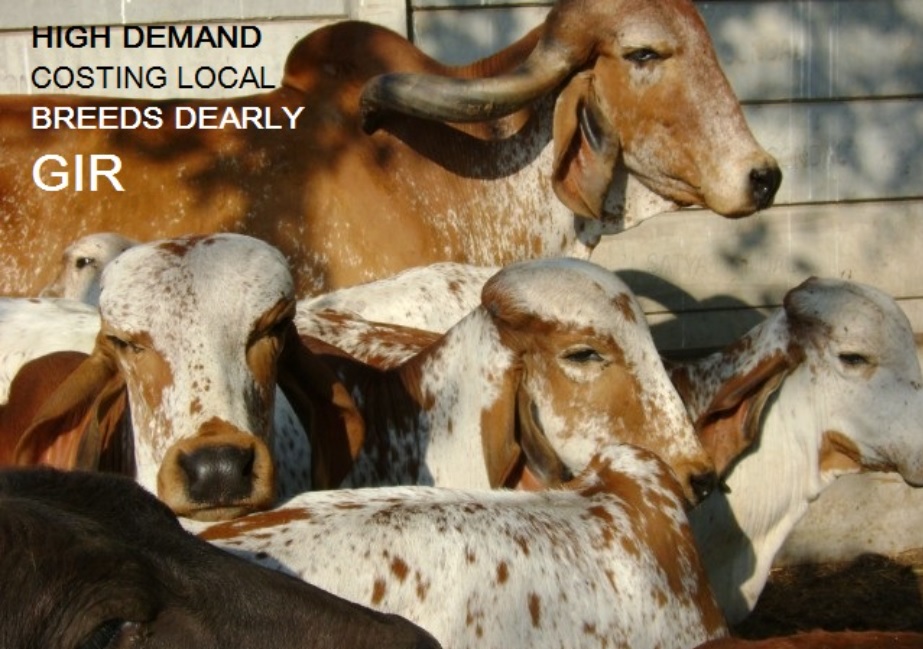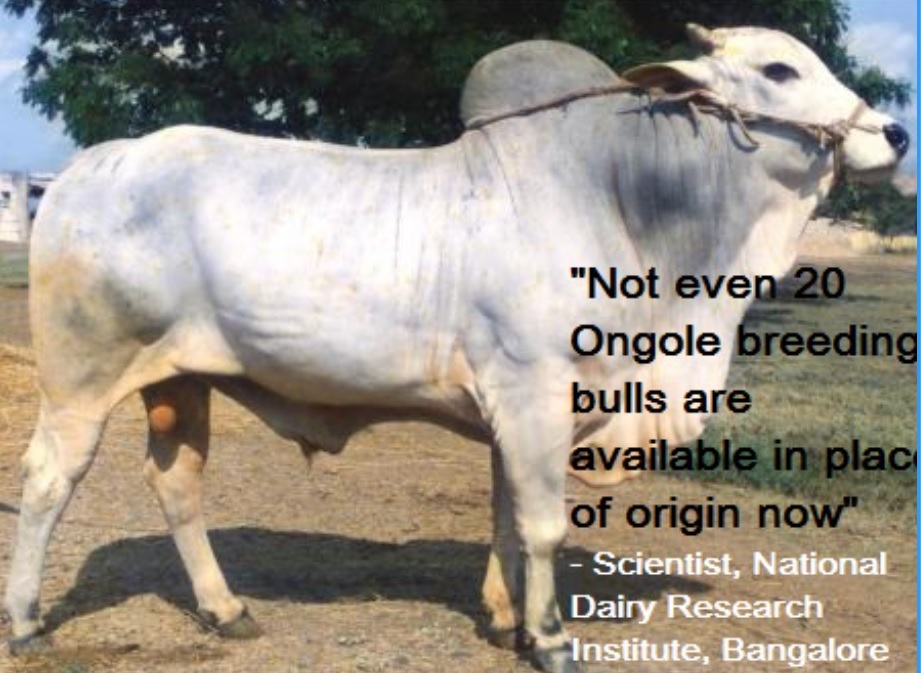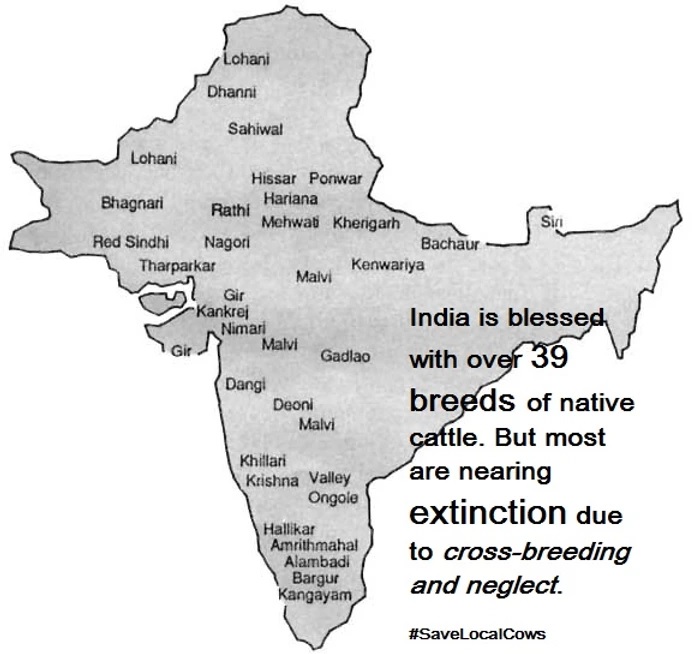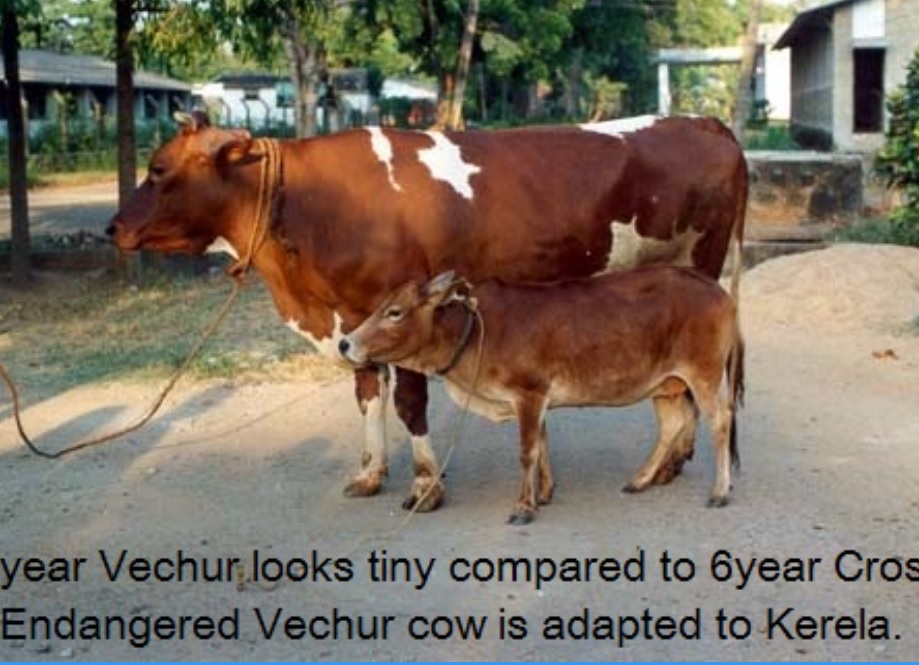The fad for Gir breed of Desi Cows, is fanned by the fact that its urine has gold. As a matter of fact, ALL Desi Cows (which have a hump referred to as ‘Surya Ketu Naadi’) synthesize gold from the Sun and pass it in their urine which is then used for Panchgavya & Ayurvedic medicine. Gold and other elements found in the cow urine has tremendous benefits for the human body. Panchgavya Therapy has helped patients suffering from all kinds of diseases. Hence this gold is not for extraction but well-being of entire human race! Gir is already the hyped breed from western part of the country for its milk. It is not that rest of the Indian breeds do not have milk. People just want quick solution for demand, in this case for A2 milk.

Breeding bulls of Ongole are fast diminishing due to lack of demand in South India despite their excellent milk and drought capabilities. A report on versatality of Ongole breed is available http://www.fao.org/docrep/V0600T/V0600T04.HTM Sahiwal (called the “Holstein of Bos Indicus”) from Punjab is being over-exploited for milk and is facing with many health issues including fewer calvings. Gir itself delivers far less yield than promised, after it is moved away from her native Gujarat.

While India is blessed with a number of milch breeds (which give heavy amounts of milk), dual breeds (which give good milk and great for drought/laborious purposes) and drought purposes all of them have been ignored for centuries. Suddenly because healthier A2 milk is in demand, people are running for few breeds of cows which are not from that geography – a repeat of mistake that was done by crossing Indian cows with foreign breeds during operation flood.

Cruelties of Greed: 1. Cross-breeding of Indian Breeds – Recently, a ‘Hariyana’ cow (endangered breed from Harayana) which was yielding about 16 litres per day was crossed with Sahiwal bull near New Delhi. Not only does the precious breed gets lost by this, but also the cow goes through a lot of agony from the time of insemination till delivery, bearing the calf which is not her own type. Recently, discussion with Joint Director, NDRI revealed that Sahiwal cows are getting multiple diseases due to abuse. 2. Stress of Travel – Gir cow from Gujarat has to travel between thousands of kilometer to reach various states in tightly packed trucks, within limited food, water and no walk. 3. Ignoring Local Bulls/Cows – While the Nandis of stone are worshipped in temples, the real Nandis for local breeds have no takers. Even some Gaushalas refuse to take them. Their life is on the streets despite the fact that without bulls, there is no future. Of tilling. Of natural farming. Of the breed. The local breeds are special:Local cows have evolved over thousands of years and are adapted to their native breeding tract. They are suited to particular agro climatic zone. Example: – Black soil requires a lot of energy to work. So heavy breeds like Ongole and Krishna Valley are found near cotton-growing regions. – Red soil retains less water and dries fast so nimble but lean breeds are required like Amrithmahal and Hallikar. – Hilly regions where cattle has to walk far and distance for food, the cows are adapted and stunted. Dwarf varieties like Malnadu Gidda, Vechur, Kasargod are found in Western Ghats.

– Places with heavy rainfalls have specialised breeds like Dangi. The skin of this breed secretes an oil element that enables them to tolerate heavy rains. – Nimari breed is found in rocky regions and has specially adapted hoofs for work in that area. As a consumer, animal lover and responsible denizen, we need to care for what is around us. Its healthier for you too! Three things you can do – 1. Adopt/Support a cow/bull native to your area – Support them in Gaushalas or your farm. To know breed of your region check http://www.nbagr.res.in/regcat.html 2. Ask for A2 milk from your local cows only. 3. Insist on Naturally grown food & Panchgavya therapy from local cows for your good health & medicine. You can write to gavyasiddha@gmail.com for more about cow-urine therapy.
